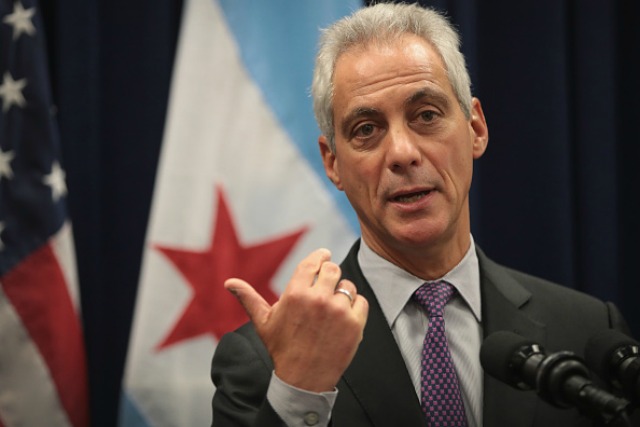Rahm's 'Ridiculous' New Education Mandate Sparks Backlash
By Stephen Gossett in News on Apr 5, 2017 6:40PM

Getty Images / Photo: Scott Olson
Rahm Emanuel made public on Wednesday an instantly controversial initiative that would require Chicago public high school students to have a letter of acceptance from either a college, military service, job program or an employment offer in order to graduate from high school.
"You won't be able to graduate ... unless you show that letter of acceptance to any one of the four outlets we talked about: college, community college, armed services or a trade," Emanuel said while appearing on CBS This Morning.
The unprecedented move would address concerns that many public school students are graduating without a clear path to higher education or employability. But it would also burden students with another graduation requirement, without necessarily addressing the barriers that keep them from succeeding. The announcement sparked a sudden outpouring of confusion and indignation online, with critics calling it short on specifics and potentially harmful for disadvantaged or special-needs students. Meanwhile, some education-law experts cast deep skepticism on such a program's efficacy or legal standing.
Micki Moran, a founding partner of the Child & Family Law Center, called the proposal "ridiculous" and "a great wish, but not grounded in reality." She said any such post-secondary acceptance requirement would require much more "scaffolding and support" from Chicago Public Schools to prepare kids. "But CPS has the worst transition track record I know of."
Moran, who works extensively in special education, said its unclear how developmentally challenged students would fit into Rahm's proposal—but the potential pitfalls would extend well beyond that group. "For disabled students, there aren't going to be any options... For some student of color in poverty where schools are failing them, it's out of their reach."
Such mandates could be effective in an ideal world, but for them to be fair would require "very significant institutional changes," Moran said. "Kids are graduating without basic life skills. We need to start there, not at the end."
Miranda Johnson, Assistant Director at the Education Law & Policy Institute at Loyola University Chicago, similarly said Emanuel's goal is "laudable" but expressed concerns about making acceptance letters mandatory. Children in foster care, kids with disabilities and homeless youth could have particular difficulty meeting the requirement, she said/
"Having this type of requirement being limited to a small subset of opportunities may limit post secondary plans in a way that would be counterproductive," Johnson said.
"Rather than some type of requirement in order to graduate, the question is, 'What can be done on the front end? ... How can the goal that Emanuel is setting forth be achieved through the proper supports and services?" she added.
Johnson, who said she had never heard of such a proposal in her career prior to Wednesday's announcement, was skeptical about where the legal command to impose such measure exists. "Im interested in seeing the legal authority in the district's ability to add requirements that above and beyond" the Illinois school code guidance, she said.